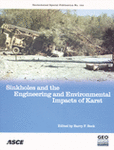Judge Dillon and Karst: Limitations on Local Regulation of Karst Hazards
Publication: Sinkholes and the Engineering and Environmental Impacts of Karst
Abstract
Most often in the United States, regulation of land use falls to local governments. Similarly, local governments form the local focus of efforts to impose regulations to minimize karst hazards. In addition, the federal government and the states impose very little regulation on karst landscapes. However, the structure of the United States' federalist form of government often limits the authority of local governments to carry out this function. The powers of the federal government, as well as those of the states, are laid out in the United States Constitution. The Tenth Amendment of the United States Constitution provides that, "[t]he powers not delegated to the United States by the Constitution, nor prohibited by it to the States, are reserved to the States respectively, or to the people." This provision at once greatly limits the powers of the federal government and places a great deal of power with the states. In addition to the federal and state governments, nearly 40,000 local governments exist in the U.S. However, the United States Constitution makes no mention of the power, if any, that should be given to these local governments. Consequently, settled law provides that local governments are mere creatures of, and under the total control of, state legislatures and state constitutions. Local governments must derive power from state constitutions, charters or enabling legislation passed by state legislative bodies. In this context, a struggle arose during the middle-1800's as to whether local governments should be vested with inherent broad powers or should be limited in authority. Judge John Dillon, an Iowa state court judge and municipal law expert, proved to be the most influential force in deciding this issues. Judge Dillon derived Dillon's Rule, which states that local governments only possess those powers expressly granted or inherently necessary to the local government. If any reasonable doubt exists, the courts resolve the doubt against the local government. The resulting constraints prove to drastically impact the scope of local government regulation in karst terrain. This paper reviews the use of Dillon's Rule across the country, finding that 39 states impose the rule, at least with respect to some local governments. The author then outlines the impact of limited local government on the regulation of karst hazards. For example, the Standard Zoning Enabling Act arguably fails to empower local governments to regulate land uses to mitigate and minimize karst hazards, include groundwater contamination. The paper concludes that many local governments lack authority to adequately regulate karst areas to protect water quality and minimize hazards. States must examine and expand existing enabling authority to authorize effective tools to manage these hazards in karst terrains.
Get full access to this chapter
View all available purchase options and get full access to this chapter.
Information & Authors
Information
Published In
Copyright
© 2005 American Society of Civil Engineers.
History
Published online: Apr 26, 2012
Authors
Metrics & Citations
Metrics
Citations
Download citation
If you have the appropriate software installed, you can download article citation data to the citation manager of your choice. Simply select your manager software from the list below and click Download.
